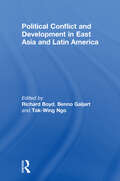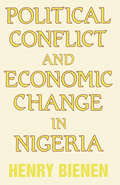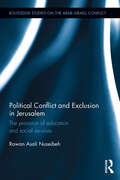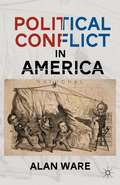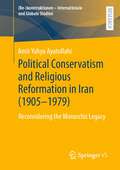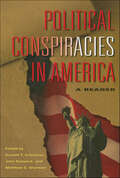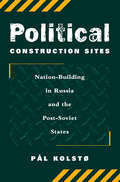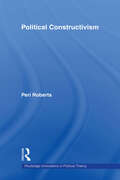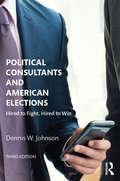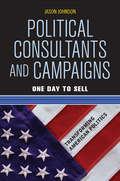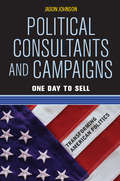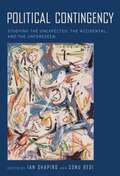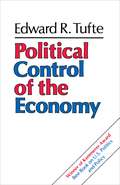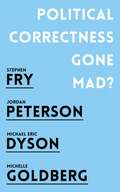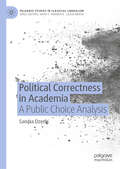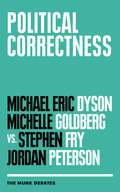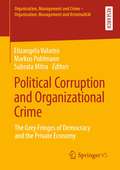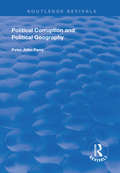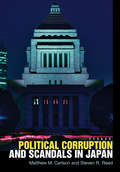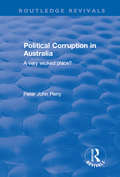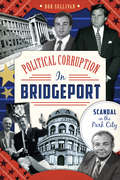- Table View
- List View
Political Conflict and Development in East Asia and Latin America
by Richard Boyd Tak-Wing Ngo Galjart BennoLong run processes of socio-economic change generate prodigious problems of social conflict and social control, and governments responsible for these processes must therefore manage the resultant conflict. Consequently, the success or failure of a government's management of such conflicts is a crucial factor in development outcomes. This volume investigates the political struggle for development specifically in two vital regions - East Asia and Latin America. This analysis calls into question the dominant emphasis on institutional and cultural bases for stable growth. A careful historical account of the two regions is presented, which permits the rigorous testing of conventional wisdoms regarding development. Of importance to a broad range of academics in the spheres of development studies, politics, political economy and sociology, this book will also make an interesting read for those with a general interest in these areas.
Political Conflict and Economic Change in Nigeria
by Henry BienenFirst Published in 1985. In the early morning hours of 31 December 1984, the Nigerian military once again removed an elected head of state. A coup carried out by senior military officers ended the Second Republic which had been ushered in by elections at the end of 1979. Political Conflict and Economic Change in Nigeria is based on articles and essays written between 1978 and 1983.
Political Conflict and Exclusion in Jerusalem: The Provision of Education and Social Services (Routledge Studies on the Arab-Israeli Conflict)
by Rawan Asali NuseibehThe political conflict over the city of Jerusalem has resulted in the breach of Palestinian Jerusalemites’ civil, political and social rights. While Israel claims sovereignty over East Jerusalem, it neglects to provide adequate services to the Palestinian residents of the city. The Israeli Jerusalem Municipality provides insufficient and highly politicised educational services to the Palestinians residents of the city, at the same time discriminating against the other Palestinian systems that provide educational services. Political Conflict and Exclusion in Jerusalem offers a detailed description of the structure of the education sector in East Jerusalem with its four main providers; the Palestinian Authority through Awqaf schools, the Israeli Authority through municipal schools, the United Nations Relief and Works Agency and private schools. Its study reveals that there is no single body that oversees the provision of educational services in the city to ensure that the services provided are sufficient and of quality. Employing a qualitative research strategy with semi-structured interviews and focus groups in Palestinian and Israeli schools, this book offers a comprehensive and revealing comparison of the educational services provided to both their students. It explores how Palestinian and Israeli students routinely receive vastly different learning opportunities, in terms of school funding, qualified staff, school facilities and school programmes, which as a result disempowers Palestinians and ensures an Israeli Jewish hegemony over the city. One of the few academic books on a highly pertinent topic, this book will be of interest to students and scholars of Middle East Studies, and a key resource for those studying the social impacts of the Israeli-Palestinian conflict.
Political Conflict in America
by Alan WareRecently, there has been a high level of conflict in American politics. Massive disagreements over government policies have pitted one group of Americans against another. This book explores how and why this style of politics developed and argues that fundamental disagreements between Americans have always been at the root of its politics.
Political Conflict in Western Europe
by Hanspeter Kriesi Edgar Grande Martin Dolezal Marc Helbling Dominic Höglinger Swen Hutter Bruno Wüest Hanspeter Kriesi Edgar Grande Martin Dolezal Marc Helbling Dominic Höglinger Swen HutterWhat are the consequences of globalization for the structure of political conflicts in Western Europe? How are political conflicts organized and articulated in the twenty-first century? And how does the transformation of territorial boundaries affect the scope and content of political conflicts? This book sets out to answer these questions by analyzing the results of a study of national and European electoral campaigns, protest events and public debates in six West European countries. While the mobilization of the losers of the processes of globalization by new right populist parties is seen to be the driving force of the restructuring of West European politics, the book goes beyond party politics. It attempts to show how the cleavage coalitions that are shaping up under the impact of globalization extend to state actors, interest groups and social movement organizations, and how the new conflicts are framed by the various actors involved.
Political Conservatism and Religious Reformation in Iran: Reconsidering the Monarchic Legacy ((Re-)konstruktionen - Internationale und Globale Studien)
by Amir Yahya AyatollahiThis book is a theoretical inquiry on the relation of the body politic with the religious movements in the time between the Constitutional Revolution and the Islamic Revolution in Iran; it illustrates speculative and historical analyses on the relationship of state, religion, and socio-political status in the late Qajar dynasty (1905-1925) and the whole Pahlavi monarchy. Particularly, it examines the applicability of “liberal conservatism” to the era of the last Shah of Iran. The thesis defines the term political conservatism in accord with Edmund Burke’s philosophy. It deals next with the definition of religious reformation, the peculiar characteristics of Islam, the Shi'ite political theology, and the contradictory usages of “Islamic reformation” in the literature. The text gives an overview of the two antagonist sides of nationalism. It provides also an analysis of the Islamic Republic as a new political phenomenon in Iranian history and the transformation of all concepts after 1979. Ayatollahi aims to assess the Iranian conservatism, the possibility of conciliation between politics and religion before the collapse of the Pahlavi, and “the conditions of possibility” for any restoration of the monarchy.
Political Conspiracies in America: A Reader
by Donald T. Critchlow, John Korasick, and Matthew C. ShermanConspiracy theories have been a part of the American experience since colonial times. There is a rich literature on conspiracies involving, among others, Masons, Catholics, Mormons, Jews, financiers, Communists, and internationalists. Although many conspiracy theories appear irrational, an exaggerated fear of a conspiracy sometimes proves to be well founded. This anthology provides students with documents relating to some of the more important and interesting conspiracy theories in American history and politics, some based on reality, many chiefly on paranoia. It provides a fascinating look at a persistent and at times troubling aspect of democratic society.
Political Construction Sites: Nation Building In Russia And The Post-soviet States
by Pal KolstoThe dissolution of the Soviet Union has provided scholars with tremendously rich material for the study of comparative nation building. Not since the decolonization of Africa in the 1960s have so many new states been established in one stroke in one region. The post-Soviet states, moreover, have all the necessary prerequisites for fruitful comparison: a number of similarities, but also significant differences in terms of size, culture, and recent history. In order to survive in the long run, modern states normally must have a population that possesses some sense of unity. Its citizens must adhere to some common values and common allegiance towards the same state institutions and symbols. This does not means that all inhabitants must necessarily share the same culture, but they should at least regard themselves as members of the same nation. Strategies to foster this kind of common nationhood in a population are usually referred to as 'nation building'. After a decade of post-Soviet nation building certain patterns are emerging, and not always the most obvious ones. Some states seem to manage well against high odds, while others appear to be disintegrating or sinking slowly into oblivion. To a remarkable degree the former Soviet republics have chosen different models for their nation building. This book examines the preconditions for these endeavors, the goals the state leaders are aiming at, and the means they employ to reach them. }
Political Constructivism (Routledge Innovations in Political Theory)
by Peri RobertsPolitical Constructivism is concerned with the justification of principles of political justice in the face of pluralism. Contemporary accounts of multiculturalism, pluralism and diversity have challenged the capacity of political theory to impartially justify principles of justice beyond the boundaries of particular communities. In this original account, Peri Roberts argues that political constructivism defends a conception of objective and universal principles that set normative limits to justifiable political practice. Political Constructivism explores this understanding in two ways. Firstly, by engaging with constructivist thinkers such as John Rawls and Onora O’Neill in order to lay out a basic understanding of what constructivism is. Secondly, the author goes on to defend a particular account of political constructivism that justifies a universal primary constructivism alongside the many secondary constructions in which we live our everyday lives. In doing so he outlines an understanding of principled pluralism which accepts diversity whilst at the same time recognising its limits. This volume will be of particular interest to students and researchers of political theory and political philosophy.
Political Consultants and American Elections: Hired to Fight, Hired to Win
by Dennis W. JohnsonWhen it comes to elections, campaigns matter. And despite the ever-increasing role of volunteers and amateurs, modern American political campaigns are a professional affair. Understanding how they are run and how campaign strategies are set requires an in-depth analysis of what political consultants do, from opposition research to public opinion polling and from directing media strategies to mobilzing voters--with fundraising a priority at all stages. At all levels of the electoral arena, modern, sophisticated campaigns cannot hope to be effective without the guiding disciplines of professional consultants. This thoroughly updated edition of Dennis W. Johnson's classic text, originally titled No Place for Amateurs, highlights the growing importance of social media, targeting and analytics, Super PACs and dark money in a post-Citizens United world.?
Political Consultants and Campaigns
by Jason JohnsonAll too often, argues Johnson (political science, Hiram College), researchers into American elections conduct their work in a manner that leaves campaign managers, consultants, and organizers out of the equation. He presents this text as a means of bridging the gap by investigating where political science theory and political professionals agree and disagree, both in order to find out about campaign managers and political professionals and to see how political science could be improved by listening to these actors. The main issues discussed are fairly standard to the field--candidate traits, political messages in campaign strategies, issue-position strategy, negative-advertising strategy, and the use of the Internet in contemporary campaigns--so the main contribution comes from the systematic investigation of the views of political professionals on these topics. Annotation ©2011 Book News, Inc. , Portland, OR (booknews. com)
Political Consultants and Campaigns
by Jason JohnsonPolitical Consultants and Campaigns: One Day to Sell examines the differences between how political science theory suggests campaigns should be run and how political consultants actually run campaigns. In the wake of consultants who effortlessly move from campaigners to policymakers, the dearth of knowledge about the attitudes, beliefs, and strategies of the consultants themselves is still a glaring absence in the analysis of American politics. How can we purport to know what is happening in American political campaigns if we don't know what is on the minds of the men and women who run them? This book provides a clearer understanding of modern-day political campaigns by revealing what is on the minds of the people who run them. With original data from consultants, campaign managers, and professional campaign schools, author Jason Johnson examines consultant behavior on message formation, policy positioning, candidate recruitment, Internet strategy, and negative advertising and compares these practices to existing political science theory. This groundbreaking research makes Political Consultants and Campaigns: One Day to Sell a must-have resource for all students of American politics, campaign managers, or anyone interested in how political campaigns in America are run.
Political Consultants and Campaigns
by Jason JohnsonPolitical Consultants and Campaigns: One Day to Sell examines the differences between how political science theory suggests campaigns should be run and how political consultants actually run campaigns. In the wake of consultants who effortlessly move from campaigners to policymakers, the dearth of knowledge about the attitudes, beliefs, and strategies of the consultants themselves is still a glaring absence in the analysis of American politics. How can we purport to know what is happening in American political campaigns if we don't know what is on the minds of the men and women who run them?This book provides a clearer understanding of modern-day political campaigns by revealing what is on the minds of the people who run them. With original data from consultants, campaign managers, and professional campaign schools, author Jason Johnson examines consultant behavior on message formation, policy positioning, candidate recruitment, Internet strategy, and negative advertising and compares these practices to existing political science theory. This groundbreaking research makes Political Consultants and Campaigns: One Day to Sell a must-have resource for all students of American politics, campaign managers, or anyone interested in how political campaigns in America are run.
Political Consultants and Campaigns: One Day to Sell (Transforming American Politics (4th Edition))
by Jason JohnsonPolitical Consultants and Campaigns: One Day to Sell examines the differences between how political science theory suggests campaigns should be run and how political consultants actually run campaigns. In the wake of consultants who effortlessly move from campaigners to policymakers, the dearth of knowledge about the attitudes, beliefs, and strategies of the consultants themselves is still a glaring absence in the analysis of American politics. How can we purport to know what is happening in American political campaigns if we don't know what is on the minds of the men and women who run them?This book provides a clearer understanding of modern-day political campaigns by revealing what is on the minds of the people who run them. With original data from consultants, campaign managers, and professional campaign schools, author Jason Johnson examines consultant behavior on message formation, policy positioning, candidate recruitment, Internet strategy, and negative advertising and compares these practices to existing political science theory. This groundbreaking research makes Political Consultants and Campaigns: One Day to Sell a must-have resource for all students of American politics, campaign managers, or anyone interested in how political campaigns in America are run.
Political Consumerism
by Dietlind Stolle Michele MichelettiShoppers can express their values as they search for value. Political consumerism is turning the market into a site for politics and ethics, as consumer choices reflect personal attitudes and purchases are informed by ethical or political assessment of business and government practice. In such forms as boycotts, when consumers refuse to buy, or buycotts, where consumers shift their purchases, the ostensibly apolitical marketplace is a site of contestation at the intersection of globalization and individualization. This book opens readers' eyes to a new way of viewing everyday consumer choices and the role of the market in our lives, illuminating the broader theoretical and historical context of concerns about sweatshops, responsible coffee, and ethical and free trade.
Political Contingency: Studying the Unexpected, the Accidental, and the Unforeseen
by Ian Shapiro and Sonu BediHistory is replete with instances of what might, or might not, have been. By calling something contingent, at a minimum we are saying that it did not have to be as it is. Things could have been otherwise, and they would have been otherwise if something had happened differently. This collection of original essays examines the significance of contingency in the study of politics. That is, how to study unexpected, accidental, or unknowable political phenomena in a systematic fashion. Yitzhak Rabin is assassinated. Saddam Hussein invades Kuwait. Hurricane Katrina hits New Orleans. How might history be different had these events not happened? How should social scientists interpret the significance of these events and can such unexpected outcomes be accounted for in a systematic way or by theoretical models? Can these unpredictable events be predicted for? Political Contingency addresses these and other related questions, providing theoretical and historical perspectives on the topic, empirical case studies, and the methodological challenges that the fact of contingency poses for the study of politics.Contributors: Sonu Bedi, Traci Burch, Jennifer L. Hochschild, Gregory A. Huber, Courtney Jung, David R. Mayhew, Philip Pettit, Andreas Schedler, Mark R. Shulman, Robert G. Shulman, Ian Shapiro, Susan Stokes, Elisabeth Jean Wood, and David Wootton
Political Control of the Economy
by Edward R. TufteSpeculations about the effects of politics on economic life have a long and vital tradition, but few efforts have been made to determine the precise relationship between them. Edward Tufte, a political scientist who covered the 1976 Presidential election for Newsweek, seeks to do just that. His sharp analyses and astute observations lead to an eye-opening view of the impact of political life on the national economy of America and other capitalist democracies.The analysis demonstrates how politicians, political parties, and voters decide who gets what, when, and how in the economic arena. A nation's politics, it is argued, shape the most important aspects of economic life--inflation, unemployment, income redistribution, the growth of government, and the extent of central economic control. Both statistical data and case studies (based on interviews and Presidential documents) are brought to bear on four topics. They are: 1) the political manipulation of the economy in election years, 2) the new international electoral-economic cycle, 3) the decisive role of political leaders and parties in shaping macroeconomic outcomes, and 4) the response of the electorate to changing economic conditions. Finally, the book clarifies a central question in political economy: How can national economic policy be conducted in both a democratic and a competent fashion?
Political Correctness Gone Mad?
by Stephen Fry Michelle Goldberg Michael Dyson Jordan Peterson&‘Without free speech there is no true thought.&’ –Jordan Peterson &‘If you&’re white, this country is one giant safe space.&’ –Michael Eric Dyson The Munk debate on political correctness Is political correctness an enemy of free speech, sparking needless conflict? Or is it a weapon in the fight for equality, restoring dignity to the downtrodden? How should we talk about the things that matter most in an era of rapid social change? Four thinkers take on one of the most heated debates in the culture wars of the twenty-first century.
Political Correctness in Academia: A Public Choice Analysis (Palgrave Studies in Classical Liberalism)
by Sandra DzenisThis book explores the phenomenon of political correctness in academia and explains why and how scholars and administrators impact PC&’s prominence in the academic sphere. To do so, it examines the actions of these agents through the lens of public choice theory, revealing how self-interested strategies drive the policies and norms of the university. The book examines the ideological dimensions of political correctness and highlights four key spheres of influence – academic research, higher education curricula, affirmative action and speech codes. The book offers a nuanced exploration of how PC and liberalism have common ground. It demonstrates how the liberal values of equality and individual liberty largely underpin PC, whose regulatory function is to protect a liberal value system from illiberal truth claims. Yet the book also shows how interest groups form around the concept of PC in universities and have successfully used systems of rent-seeking and collective action to shape institutional policy and protect their members from ideological and professional competition, which can be seen as a violation of classical liberal principles of fair competition and equal opportunity. This book is a valuable tool for researchers working in political economy and PPE (politics, philosophy and economics), as well as those interested in the political economy of academia and the concept of PC more generally.
Political Correctness: The Munk Debates (The Munk Debates #2018)
by Stephen Fry Michelle Goldberg Michael Dyson Jordan PetersonThe twenty-second Munk Debate pits acclaimed journalist, professor, and ordained minister Michael Eric Dyson and New York Times columnist Michelle Goldberg against renowned actor and writer Stephen Fry and University of Toronto professor and author Jordan Peterson to debate the implications of political correctness and freedom of speech.Is political correctness an enemy of free speech, open debate, and the free exchange of ideas? Or, by confronting head-on the dominant power relationships and social norms that exclude marginalized groups are we creating a more equitable and just society? For some the argument is clear. Political correctness is stifling the free and open debate that fuels our democracy. It is also needlessly dividing one group from another and promoting social conflict. Others insist that creating public spaces and norms that give voice to previously marginalized groups broadens the scope of free speech. The drive towards inclusion over exclusion is essential to creating healthy, diverse societies in an era of rapid social change.
Political Corruption and Organizational Crime: The Grey Fringes of Democracy and the Private Economy (Organization, Management and Crime - Organisation, Management und Kriminalität)
by Markus Pohlmann Elizangela Valarini Subrata MitraLevel of compliance - one of the most important prerequisites of good governance - varies widely across countries of the Global North and the less developed, Global South. Acts of non-compliance, such as electoral irregularities, dubious deals between private and public sectors, questionable role of the justice systems and financial scandals, though they vary greatly across countries, are an omnipresent reality of contemporary life. This volume has brought together a number of case studies of such deviant behavior in political, juridical and corporate fields, from several countries of Asia, Europe and South America, within a common framework. Instead of a moral approach based exclusively on the legality and illegality of the act, the authors of these essays dissect non-compliance analytically, taking culture and context into account. They argue that, while criminal and corrupt dealings deserve to be exposed by all means from an ethical point of view, seen from an interdisciplinary angle, one needs to probe deeper into the dynamic that leads to such non-compliance with the law in the first place.
Political Corruption and Political Geography (Routledge Revivals)
by Peter J. PerryFirst published 1997, this volume examines the way in which political corruption remains neglected as a matter of scholarly enquiry and research. There is still a powerful and traditional taboo which is quite out of the step with the topic’s real world significance and the increasing attention it receives from serious sections of the media. The book aims by systematic exposition and case study to break down that taboo and to demonstrate the topic’s importance within a framework provided by the discipline of geography. The novelty of the book is then that it considers a formerly unconsidered factor - corruption - as part of the world’s geography, as both part of the geographical context in which human activity takes place and as a spatially variable condition explicable at least in part in terms of other geographies. The conclusion is that much geographical scholarship ignores this factor at the risk of its credibility.
Political Corruption and Scandals in Japan
by Steven R. Reed Matthew M. CarlsonCombining history with comparative politics, Matthew M. Carlson and Steven R. Reed take on political corruption and scandals, and the reforms designed to counter them, in post–World War II Japan.Political Corruption and Scandals in Japan makes sense of the scandals that have plagued Japanese politics for more than half a century and attempts to show how reforms have evolved to counter the problems. What causes political corruption to become more or less serious over time? they ask. The authors examine major political corruption scandals beginning with the early postwar period until the present day as one way to make sense of how the nature of corruption changes over time. They also consider bureaucratic corruption and scandals, violations of electoral law, sex scandals, and campaign finance regulations and scandals.In the end, Carlson and Reed write, though Japanese politics still experiences periodic scandals, the political reforms of 1994 have significantly reduced the levels of political corruption. The basic message is that reform can reduce corruption. The causes and consequences of political corruption in Japan, they suggest, are much like those in other consolidated democracies.
Political Corruption in Australia: A Very Wicked Place? (Routledge Revivals)
by Peter John PerryThis title was first published in 2001: Despite considerable expansion, the scholarly literature on political corruption has remained fragmentary, often polarized, consisting either of sweeping systematic statements, or case-specific examples. Perry bridges this gap and proves the need for further such study in this most worthwhile examination of the place of political corruption in Australia. The Australian experience is paid thorough, yet concise attention and then it is related to the concept of political corruption in its various and changing forms and interpretations. Assuming no familiarity with the central intellectual issues, Perry lucidly explores them in terms of their method, practice and definition with particular reference to Australia. Primarily suitable for academics interested in politics, geography, development studies, history and sociology, this book’s accessible style also makes it of interest to a general audience.
Political Corruption in Bridgeport: Scandal in the Park City
by Rob SullivanFirst incorporated in 1836, Bridgeport is notorious for a raucous political history that includes both liberating accomplishments and salacious scandals. From a state senator who spent several years in prison for racketeering to a mayor who was caught taking drugs while in office, Bridgeport has had its fair share of unlawful politicians. The political playground of the city has also seen invigorating leaders who fought hard to bring jobs, industries and prosperity to the community. The city's most famous mayor was none other than circus impresario P.T. Barnum. Discover the stories behind some of the most contentious elections, like the alleged ballot stuffing that ended the twenty-four-year era of socialist mayor Jasper McLevy or the power politics and threats that landed John Mandanici in office. Join author and reporter Rob Sullivan as he brings the Park City's fiery political history alive.
